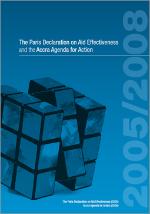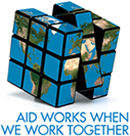Effective development co-operation
Paris Declaration and Accra Agenda for Action
Countries adhering to the Paris Declaration and AAA Paris Declaration and Accra Agenda for Action
At the Second High Level Forum on Aid Effectiveness (2005) it was recognised that aid could - and should - be producing better impacts. The Paris Declaration was endorsed in order to base development efforts on first-hand experience of what works and does not work with aid. It is formulated around five central pillars: Ownership, Alignment, Harmonisation, Managing for Results and Mutual Accountability.
In 2008 at the Third High Level Forum on Aid Effectiveness all OECD donors, more than 80 developing countries and some 3 000 civil society organisations from around the world joined representatives of emerging economies, United Nations and multilateral institutions and global funds in the negotiations leading up to and taking place during the Accra meeting. The Accra Agenda for Action (AAA) was endorsed. The AAA both reaffirms commitment to the Paris Declaration and calls for greater partnership between different parties working on aid and development.
The Paris Declaration on Aid Effectiveness
The Paris Declaration (2005) is a practical, action-oriented roadmap to improve the quality of aid and its impact on development. It gives a series of specific implementation measures and establishes a monitoring system to assess progress and ensure that donors and recipients hold each other accountable for their commitments. The Paris Declaration outlines the following five fundamental principles for making aid more effective:
|
|
|
The Accra Agenda for Action
Designed to strengthen and deepen implementation of the Paris Declaration, the Accra Agenda for Action (AAA, 2008) takes stock of progress and sets the agenda for accelerated advancement towards the Paris targets. It proposes the following four main areas for improvement:
 |
|
The Paris Declaration and Accra Agenda for Action is available in English l French l Spanish
The Paris Declaration is also available in Arabic l German l Japanese l Moldovian/Romanian l Portuguese l Russian l
Global Partnership Monitoring
The Paris Declaration established a monitoring system to assess development stakeholders' progress towards more effective development cop-operation.
Read more about the Global Partnership Monitoring here and the results of Monitoring Rounds here.
Further information
Related Documents
- Paris Declaration on Aid Effectiveness - Arabic
- Déclaration de Paris
- Paris Declaration on Aid Effectiveness - German
- Paris Declaration on Aid Effectiveness - Japanese
- Paris Declaration on Aid Effectiveness - Moldovan
- Paris Declaration on Aid Effectiveness - Portuguese
- Paris Declaration on Aid Effectiveness - Russian
